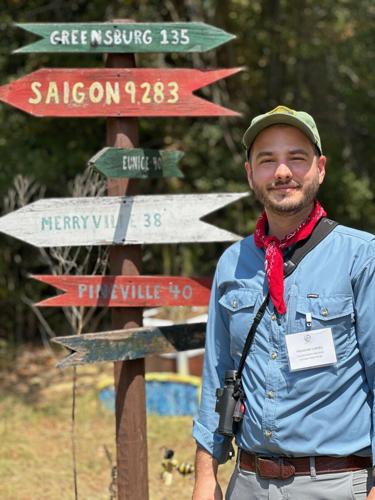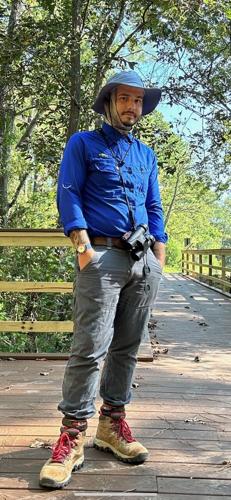When Alex Landry was researching a final course project for the Louisiana Master Naturalists of Greater Baton Rouge, he was excited to find a website that helps connect people with disabilities to birding, one of his favorite hobbies.
Birdability is an organization that strives to help people with disabilities and other health concerns enjoy the outdoors. This includes those with mobility challenges, blindness or low vision, chronic illness, intellectual or developmental disabilities, mental illness, and those who are neurodivergent, deaf, hard of hearing, or experiencing other health concerns.
The site documents accessible trails, describing birding locations with details of the accessibility features, and offers more ideas in general about how to be more inclusive to birders.
“Everybody has different levels of access,” Landry said.
He knows personally how important nature is for physical and mental well-being. No stranger to hospitals or physical restrictions, Landry was diagnosed with cancer early in his adult life at 21. After undergoing treatment, the following year he broke femurs in both legs in a car accident. Another bout of cancer followed the next year.
“I was in a hospital and wheelchair for a long time. I always loved being outside and being around water. All I kept thinking was, ‘How can I get back outside?’” Landry said.
“If I had been able to have access to something like the Birdability website back then, it would have been great,” he said.
Birdabililty was founded in 2018 by Virginia Rose, a Texas woman with a spinal cord injury who relies on a manual wheelchair to get around. She discovered birding later in life and along with the joy of seeing the actual birds, she found fun in being part of a like-minded community. She deemed it “the perfect kind of exercise to enhance her health and well-being.”
The National Audubon Society was alerted and supported a “Birdability Week” in 2020. Birdability became a registered nonprofit with a national and international scope and a full-time staff member.
The Birdabilty website has maps that show accessibility spots in state and national parks and other natural areas. A five-page site review checklist, available on website, can help those who are looking to determine the physical accessibility of birding locations to ensure a successful outing. It takes volunteers visiting these sites to update and complete checklists to help those who need them.
“It’s important to visit a site. For instance, some boardwalks might work for wheelchairs, but do the ramps have raised edges on the end of them that would help stop a wheelchair from flying off?” Landry said.
As a Birdability captain, Landry works to seek out potentially accessible birding locations, completes site reviews and arranges bird accessible birding outings. When he first started, there was only one site in Louisiana that was listed as accessible on the website: the Joyce Wildlife Management Area in Ponchatoula.
“Even that write-up needs more detail, because there are train tracks nearby and if you are hearing-impaired, that could be a risk,” he said.
Landry has added six more places, all located on the northshore near his home in Mandeville. He hopes to enlist more volunteers throughout the state to assist in adding more available sites.
Landry will present the program “Birdability” to the public at 6:30 p.m. Wednesday, Jan. 31, at the Main Library at Goodwood Library, 7711 Goodwood Blvd., Room 102. The Baton Rouge Audubon Society is sponsoring the event.
“We really hope to bring the birds to the people as best we can,” Landry said.
This story is supplied by Louisiana Master Naturalists of Greater Baton Rouge, which seeks to advance awareness, understanding and stewardship of the natural environment. For more information, email info@lmngbr.org.






